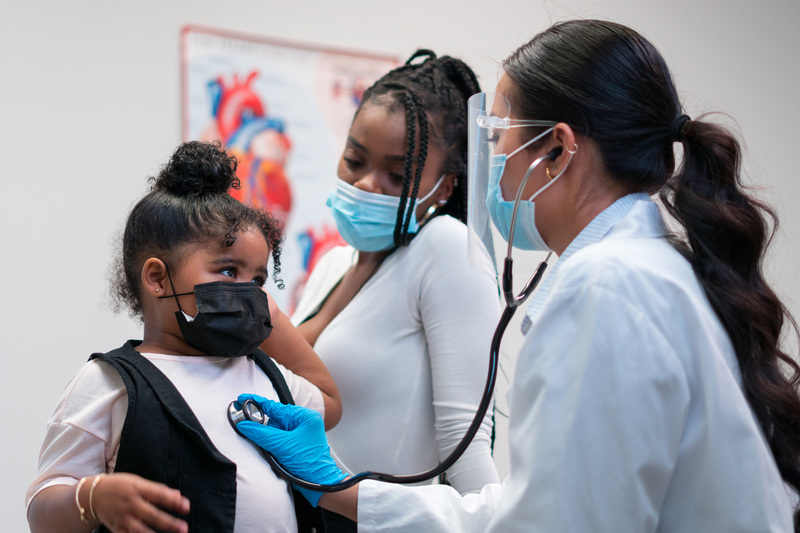New, rare syndrome puts children at risk
13 November 2020 | Story Nobhongo Gxolo. Photo Getty Images. Voice Lerato Molale. Read time 6 min.
Multi-system inflammatory syndrome in children (MIS-C), a rare disease which seems to have COVID-19 as a precursor, has been found to develop in children a few weeks after the onset of the viral infection.
Researchers at the University of Cape Town’s (UCT) Faculty of Health Sciences have joined forces with other paediatric specialists from across the country to gather data that will provide a better understanding of this illness, which further compromises the immune system of children.
When children contract COVID-19 they are often not badly affected. In fact, according to a Rapid Risk Assessment by the European Centre for Disease Prevention and Control, as of mid-May 2020 only 2.1% of all laboratory-confirmed COVID-19 cases reported to The European Surveillance System were in the age group between 0 and 14.
Additionally, the report states that one of the reasons the true incidence in children remains unknown “could be that the milder symptoms that children display lead to a low testing rate”.
“Developing an understanding for this atypical immune response in this isolated cluster of children is key.”
MIS-C, also known as paediatric inflammatory multi-system syndrome temporally associated with SARS-CoV-2 (PIMS-TS), presents with symptoms that are similar to those of both Kawasaki disease and toxic shock syndrome. These are characterised by, among others, fever, abdominal pain and cardiac involvement.
Developing an understanding for this atypical immune response in this isolated cluster of children is key.
Dr Kate Webb, who is leading on this research at UCT, said that the virus seems to trigger the syndrome “and causes fevers, rashes, heart and other organ problems in children”.
Dr Webb is a Crick African Network Research Fellow and consultant paediatric rheumatologist in the Department of Paediatrics and Child Health. She has teamed up with Professor Liesl Zühlke, a paediatric cardiologist based in the Division of Cardiology and a winner of the prestigious United Kingdom (UK) Medical Research Council and UK Department for International Development (MRC/DFID) African Research Leader Award.
Collaborative platform
When the Wellcome Centre for Infectious Diseases Research in Africa (CIDRI-Africa) put out a call inviting researchers to apply for COVID-19 funding, Professor Zühlke, an affiliate member of the Institute of Infectious Disease and Molecular Medicine (IDM), based at UCT’s Faculty of Health Sciences, was one of the six applicants awarded a grant as an affiliate of the centre.
As the principal investigator, she initially set up a biorepository for paediatric COVID-19 and then, in collaboration with Webb, developed the research project on MIS-C.
This research aims to capture data from children with COVID-19 and MIS-C across the country. Additionally, a collaborative platform to collect these data from across sub-Saharan Africa will be developed.
The information will provide an in-depth understanding of both the virus and the syndrome in these children, providing valuable data for locally appropriate, evidence-based disease mitigation, risk stratification and treatment strategies.
“We will be working hard to make sure that African and South African children get represented in the global data.”
Zühlke and Webb are investigating the incidence of MIS-C, which has expressed a concerning bias towards children of black, Asian and minority ethnic (BAME) communities in other countries. The team saw their first case in June of this year, and there has since been an emerging cluster of children presenting as critically ill with the syndrome in the Western Cape.
“The majority of our patients are of BAME origin, and this has been the trend throughout the world. We don’t know why this is,” said Webb.
“There are many potential reasons, but we will be working hard to make sure that African and South African children get represented in the global data so that we can try to answer this question, while also ensuring that the research questions and findings are relevant, accessible and beneficial to these children.”
Prompt action
Webb explained that local doctors had heeded the trends they were picking up from overseas to help ready South Africa’s health system for this new work.
“As our pandemic was a bit later than in Europe and the [United States], we were forewarned about MIS-C. So as soon as we started seeing cases, we knew that we were well placed to gather data and start to perform research to rapidly learn more about this new disease.”
It was as a result of their prompt action and getting involved early on that Webb and her team were able to publish the first case series in Africa to warn other medical practitioners about what to look out for and what to expect.
Collaboration is key in developing new insights, and it was this thinking that prompted paediatricians from across the country to set up an MIS-C working group.
“We set this up informally at first by talking to each other via an online group. We now have representatives from each province and from most of the referral hospitals that will treat these children,” said Webb.
“This disease has no evidence-based treatment or diagnostic guidelines. So, we set up the group to spread awareness, learn from each other and work together to get answers and conduct this really urgent research.”
 This work is licensed under a Creative Commons Attribution-NoDerivatives 4.0 International License.
This work is licensed under a Creative Commons Attribution-NoDerivatives 4.0 International License.
Please view the republishing articles page for more information.










